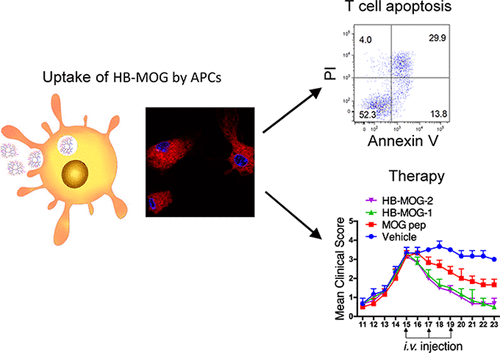Our official English website, www.x-mol.net, welcomes your
feedback! (Note: you will need to create a separate account there.)
Cytomembrane Infused Polymer Accelerating Delivery of Myelin Antigen Peptide to Treat Experimental Autoimmune Encephalomyelitis
ACS Nano ( IF 15.8 ) Pub Date : 2018-09-28 00:00:00 , DOI: 10.1021/acsnano.8b06575 Jian Li 1 , Ding Qiu 1 , Yuqing Liu 2, 3 , Jian Xiong 1 , Ying Wang 3 , Xia Yang 1 , Xiaolan Fu 1 , Lixin Zheng 4 , Gaoxing Luo 3 , Malcolm Xing 2, 3 , Yuzhang Wu 1
ACS Nano ( IF 15.8 ) Pub Date : 2018-09-28 00:00:00 , DOI: 10.1021/acsnano.8b06575 Jian Li 1 , Ding Qiu 1 , Yuqing Liu 2, 3 , Jian Xiong 1 , Ying Wang 3 , Xia Yang 1 , Xiaolan Fu 1 , Lixin Zheng 4 , Gaoxing Luo 3 , Malcolm Xing 2, 3 , Yuzhang Wu 1
Affiliation

|
While there has been extensive development of soluble epitope-specific peptides to induce immune tolerance for the treatment of autoimmune diseases, the clinical efficacy of soluble-peptides-based immunotherapy was still uncertain. Recent strategies to develop antigen carriers coupled with peptides have shown promising results in preclinical animal models. Here we developed functional amphiphilic hyperbranched (HB) polymers with different grafting degrees of hydrophobic chains as antigen myelin antigen oligodendrocyte glycoprotein (MOG) peptide carriers and evaluated their ability to induce immune tolerance. We show that these polymers could efficiently deliver antigen peptide, and the uptake amount by bone marrow dendritic cells (BMDCs) was correlated with the hydrophobicity of polymers. We observe that these polymers have a higher ability to activate BMDCs and a higher efficacy to induce antigen-specific T cell apoptosis than soluble peptides, irrespective of hydrophobicity. We show that intravenous injection of polymer-conjugated MOG peptide, but not soluble peptide, markedly treats the clinical symptoms of experimental autoimmune encephalomyelitis in mice. Together, these results demonstrate the potential for using amphiphilic HB polymers as antigen carriers to deliver peptides for pathogenic autoreactive T cell deletion/tolerance strategies to treat autoimmune disorders.
中文翻译:

细胞膜注入聚合物加速髓磷脂抗原肽的递送以治疗实验性自身免疫性脑脊髓炎
尽管已经广泛开发了可溶性表位特异性肽以诱导免疫耐受以治疗自身免疫疾病,但是基于可溶性肽的免疫疗法的临床疗效仍不确定。开发与肽偶联的抗原载体的最新策略在临床前动物模型中显示出令人鼓舞的结果。在这里,我们开发了具有不同接枝度的疏水链作为抗原髓磷脂抗原少突胶质糖蛋白(MOG)肽载体的功能性两亲性超支化(HB)聚合物,并评估了它们诱导免疫耐受的能力。我们表明,这些聚合物可以有效地递送抗原肽,并且骨髓树突状细胞(BMDCs)的摄取量与聚合物的疏水性相关。我们观察到,这些聚合物比可溶性肽具有更高的激活BMDC的能力和更高的诱导抗原特异性T细胞凋亡的功效,而与疏水性无关。我们显示静脉内注射聚合物偶联的MOG肽,而不是可溶性肽,可明显治疗小鼠实验性自身免疫性脑脊髓炎的临床症状。在一起,这些结果证明了使用两亲性HB聚合物作为抗原载体递送用于病原性自身反应性T细胞缺失/耐受策略以治疗自身免疫性疾病的肽的潜力。显着治疗小鼠实验性自身免疫性脑脊髓炎的临床症状。在一起,这些结果证明了使用两亲性HB聚合物作为抗原载体递送用于病原性自身反应性T细胞缺失/耐受策略以治疗自身免疫性疾病的肽的潜力。显着治疗小鼠实验性自身免疫性脑脊髓炎的临床症状。在一起,这些结果证明了使用两亲性HB聚合物作为抗原载体递送用于病原性自身反应性T细胞缺失/耐受策略以治疗自身免疫性疾病的肽的潜力。
更新日期:2018-09-28
中文翻译:

细胞膜注入聚合物加速髓磷脂抗原肽的递送以治疗实验性自身免疫性脑脊髓炎
尽管已经广泛开发了可溶性表位特异性肽以诱导免疫耐受以治疗自身免疫疾病,但是基于可溶性肽的免疫疗法的临床疗效仍不确定。开发与肽偶联的抗原载体的最新策略在临床前动物模型中显示出令人鼓舞的结果。在这里,我们开发了具有不同接枝度的疏水链作为抗原髓磷脂抗原少突胶质糖蛋白(MOG)肽载体的功能性两亲性超支化(HB)聚合物,并评估了它们诱导免疫耐受的能力。我们表明,这些聚合物可以有效地递送抗原肽,并且骨髓树突状细胞(BMDCs)的摄取量与聚合物的疏水性相关。我们观察到,这些聚合物比可溶性肽具有更高的激活BMDC的能力和更高的诱导抗原特异性T细胞凋亡的功效,而与疏水性无关。我们显示静脉内注射聚合物偶联的MOG肽,而不是可溶性肽,可明显治疗小鼠实验性自身免疫性脑脊髓炎的临床症状。在一起,这些结果证明了使用两亲性HB聚合物作为抗原载体递送用于病原性自身反应性T细胞缺失/耐受策略以治疗自身免疫性疾病的肽的潜力。显着治疗小鼠实验性自身免疫性脑脊髓炎的临床症状。在一起,这些结果证明了使用两亲性HB聚合物作为抗原载体递送用于病原性自身反应性T细胞缺失/耐受策略以治疗自身免疫性疾病的肽的潜力。显着治疗小鼠实验性自身免疫性脑脊髓炎的临床症状。在一起,这些结果证明了使用两亲性HB聚合物作为抗原载体递送用于病原性自身反应性T细胞缺失/耐受策略以治疗自身免疫性疾病的肽的潜力。











































 京公网安备 11010802027423号
京公网安备 11010802027423号